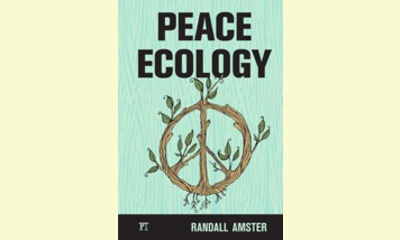|
|
Peace Ecology: A Book Review
an article by David Swanson
With serendipitous timing, as a big march for the climate, and
various related events, are planned on and around the International
Day of Peace, Randall Amster has just published an important book
called Peace Ecology. 
click on photo to enlarge
This book bridges divides that very much need to be bridged
between peace activism and peace academia, and between peace
advocacy and environmentalism. This is, in fact, a peace book for
deep environmentalists and an environmental book for deep peace
advocates.
Typically, I think, peace activists appear to the peace academic as a
bit uninformed, ahistorical, reactive, and negative in the sense of
being "against something rather than for something."
Peace academics, I'm afraid, often appear to the peace activist as
uninterested in ending wars, uncurious about the evils of wars,
unimpressed by the military industrial complex as a cause of wars,
and altogether too concerned with the personal virtues of people
who are in no way responsible for the scourge of war. It is the rare
political studies academic who occasionally can be spotted
opposing war or documenting the superiority of nonviolent
struggle, whereas the peace studies scholars are essentially
advocates of environmentalism and democracy who -- unlike other
environmentalists and democrats -- happen to recognize the
ginormous roadblock that militarism presents for their agenda. Or
so it appears to the activist, who searches in vain for any large
academic contingent giving war and war propaganda the full
critique they so richly deserve.
The environmentalist, meanwhile, as represented by the larger
environmentalist groups and their spokespeople, appears to the
peace activist as a dupe or a war-monger, someone who wants to
save the earth while cheering on the institution that constitutes its
single biggest destroyer.
The peace activist, when spotted by the otherwise occupied
environmentalist, must appear something of a fool, a traitor, or a
Vladimir-Putin-lover.
Amster is an academic for peace and the environment with a strong
inclination toward activism. Parts of his book could have been
written by an environmentalist enamored with war, but most of it
could not have been. What Amster is after is a worldview within
which we avert the dangers of both war and environmental
destruction, including by recognizing their interaction.
War advocates would tell those developing organic communal
gardens and gift economies and natural sanctuaries, and other
projects that Amster writes about, that "our brave troops" are
providing the safe space in which to pursue such luxuries. Amster
would, I think, tell the war advocates that their project is in fact
rapidly reducing that space, that these "luxury" efforts are in fact
necessary for survival, and that understanding them requires a state
of mind that also condemns war as an unmitigated disaster.
"This may seem idealistic," Amster writes of the prospect of a
society dedicated to peace, "but consider that it is no more so than
continuing on our present course and hoping for a happy ending."
(This article is continued in the discussionboard)
|








|
DISCUSSION
There is no question yet associated with this article.
* * * * *
LATEST READER COMMENT:
(The following is continued from the main article listed above.)
Amster notes that the New York Times considers it "accepted wisdom" that advocates of protecting the climate must promote the idea that climate change threatens "national security." The idea is that climate-induced disasters and shortages produce wars. While Amster doesn't say so, this is a view that has been expressed by Bill McKibben, prominent organizer of the upcoming march. If his organization, 350.org, would object each time President Obama sends another 350 troops to Iraq, it would begin taking on the biggest consumer of oil we have: the military. Such an act would be unprecedented for any large U.S. environmental organization.
Of course, in reality disasters lead to wars only when a society chooses to address them with wars, and resource abundance has led to wars as often as scarcity. Sustainability and egalitarianism, Amster argues, can encourage stability, whereas unsustainable exploitation and inequality mean instability and potentially war. Should we work to limit the level of climate change or to limit its suffering by adapting to it? Amster points out that the same practices can often do both. One that can't, however, is war which exacerbates the problem while in fact failing to adapt to it.
Ian Morris recently published a remarkably stupid book arguing for the merits of war. . ...more.

|
|









